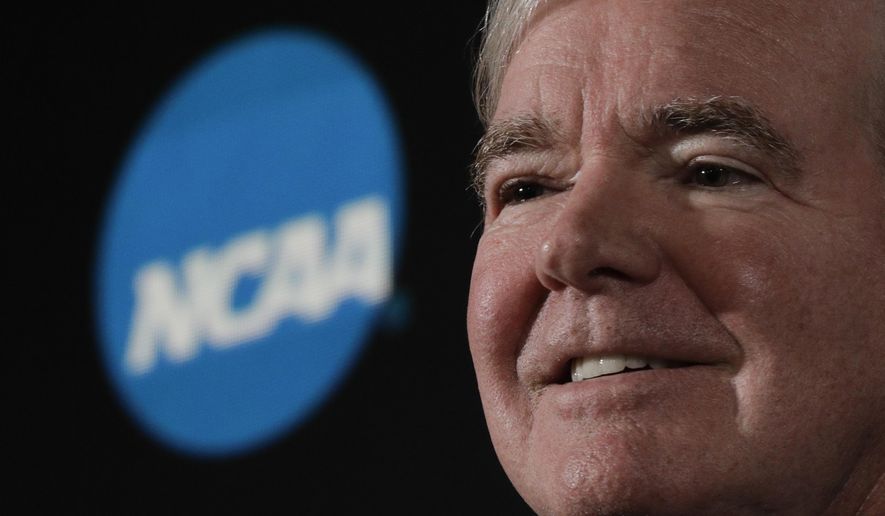No piece of the pie for college athletes, just the knife

By DERON SNYDER (as published in The Washington Times)
“If you stick a knife in my back nine inches and pull it out six inches, there’s no progress. If you pull it all the way out, that’s not progress. Progress is healing the wound that the blow made. And they haven’t even pulled the knife out much less healed the wound. They won’t even admit the knife is there.” – Malcolm X.
The NCAA, finally, has sheepishly acknowledged that … um … yeah … there’s a blade jutting out from college athletes’ backs.
But the organization remains intent on incremental extraction, not full removal and complete restoration.
That’s the takeaway from NCAA president Mark Emmert’s entreaties Tuesday on Capitol Hill, where he requested help from Sens. Mitt Romney (R-Utah) and Chris Murphy (D-Conn.). The winds of change are howling and Emmert seeks federal assurance that his so-called “collegiate model” won’t be left in ruins.
“The NCAA wants the status quo and they are praying Congress will grant that,” Ramogi Huma said Tuesday at a “Future of Sports” panel sponsored by the Aspen Institute. Huma is executive director of the National College Players Association, which advocates for college athletes.
Actually, Emmert is willing to concede a tweak to the system – specifically, granting athletes the rights to their name, image and likeness – provided that the NCAA retains control of everything else.
His most pressing concern is keeping athletes away from the organization’s multibillion-dollar pie.
California passed a law in September that will make it illegal for schools in the state to punish athletes for profiting from their NIL starting in 2023. Roughly 25 other states are considering similar measures, with some possibly going into effect next summer. Emmert sees the groundswell as a chance to earn brownie points by acquiescing, while it diverts attention from the NCAA’s other fundamentally unfair pillar.
Allowing college athletes to earn compensation for their NIL is one thing. Allowing them to be compensated for their substantial contributions to the bottom line is something else altogether. Emmert wants Congress to assist in creating a uniform policy on NIL, ultimately hoping that it also reinforces the NCAA’s stance on paying athletes.
Instead of giving the NCAA credit for finally yielding on name, image and likeness rights, we should ask what took so long. How did we ever accept the notion that college athletes should lose basic rights that are afforded to every college student?
My youngest daughter, Sequoia, is on a music scholarship at Michigan State. She plays the keyboard regularly for various events and weekly for a church service. For her time and talent, she is compensated, with no fear of Michigan State pulling her scholarship. In fact, the school helps music students secure paying gigs!
“It’s only the student-athlete that we have carved out a specific segment in our society to say, ‘No, you’re the only ones in our country that we own you and your likeness while you’re at this university,’” Rep. Mark Walker (R-N.C.) said Tuesday at the Aspen Institute.
Not everyone is fooled by Emmert’s sudden reversal after the NCAA’s lifelong aversion to NIL compensation and federal lawmakers’ input.
After Emmert met with Romney and Murphy, Walker issued a statement that referred to Emmert as “the chief apologist for an exploitative system.” Walker has proposed a bill that would revoke the NCAA’s nonprofit tax exemptions unless college athletes receive NIL rights.
Murphy rightly noted that name, image and likeness issues are just one part of the problem. He said he’s interested in solutions that “also speak to issues of broader compensation and perhaps a fairer mechanism of compensation than simply making money off of endorsement deals.
“I think it’s time for us to recognize that student athletes need to get a little bit more than they are today – to receive a little bit more protection financially and otherwise,” Murphy said.
It’s worrisome that he twice referenced “a little bit more,” which suggests he favors capping athletes’ compensation opposed to letting the free market operate. Romney indicated a similar paternalistic mindset on ESPN’s “Outside the Lines” in October, when he fretted about the possibility of “a couple of athletes on campus driving around in Ferraris while everyone else is basically having a hard time making ends meet.”
By all means, establish a baseline so no one has to struggle.
However, don’t act like LSU’s fourth-string guard and its Heisman Trophy-winning quarterback are equals in earning power. If someone decides that Joe Burrow is worth a fancy sports car, there’s no good reason to prohibit the transaction.
Allowing athletes to maximize their earning potential via NIL is great.
But real progress won’t occur until they receive a cut of the NCAA’s pie, and stop being cut out.
— Brooklyn-born and Howard-educated, Deron Snyder writes his award-winning column for The Washington Times on Tuesdays and Thursdays. Follow him on Twitter @DeronSnyder.
 Follow
Follow
